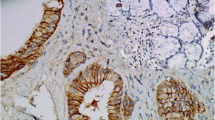Abstract
Gallbladder cancer, the most common biliary tract malignancy, is a highly malignant neoplasm. In the present work, we have analyzed the significance of cell cycle-related proteins to predict prognosis and to provide guidance for optimal therapeutic decision-making in patients with gallbladder adenocarcinoma. The expressions of p16, p21, p27, p53, p63, cyclin D1, bcl-2 and bcl-6 were examined in a tissue microarray constructed from 96 cases of gallbladder adenocarcinoma by immunohistochemistry and correlated with clinicopathologic prognostic factors. Expression of p16 was correlated with a low pT stage, adenoma background and good prognosis. Cases with p63 expression showed a higher T stage, more frequent perineural invasion and poor prognosis when compared to cases without p63 expression. Over-expression of p53 or loss of p53 was associated with poor tumor differentiation, frequent distant metastasis and low disease-specific survival rate. The expressions of p21, p27, bcl-2, bcl-6 and cyclin D1 were not significant prognostic factors for gallbladder adenocarcinoma. These results indicate that p16, p63 and p53 can be used as prognostic markers in gallbladder adenocarcinoma; especially p53 and p63 as poor prognostic markers and p16 as a favorable prognostic marker.


Similar content being viewed by others
References
Miller G, Jarnagin WR (2008) Gallbladder carcinoma. Eur J Surg Oncol 34(3):306–312
Jayaraman S, Jarnagin WR (2010) Management of gallbladder cancer. Gastroenterol Clin North Am 39(2):331–342
Goldin RD, Roa JC (2009) Gallbladder cancer: a morphological and molecular update. Histopathology 55(2):218–229
Pietenpol JA, Kastan M (2004) Control of the cell cycle. In: Abeloff M, Armitage J, Niederhuber J (eds) Clinical oncology. 3rd edn. Chruchill & Livingstone, pp 81–95
Bosman FT, Carneiro F, Hruban RH, Theise ND (2010) WHO Classification of Tumours of the Digestive System. 4th edn., Lyon
Edge SB, Byrd DR, Compton CC, April GF, Greene FL, Trotti A (2010) AJCC cancer staging manual, 7th edn. Springer, New York
Hanahan D, Weinberg RA (2000) The hallmarks of cancer. Cell 100(1):57–70
Sherr CJ (1996) Cancer cell cycles. Science 274(5293):1672–1677
Gerdes B, Ramaswamy A, Ziegler A, Lang SA, Kersting M, Baumann R, Wild A, Moll R, Rothmund M, Bartsch DK (2002) p16INK4a is a prognostic marker in resected ductal pancreatic cancer: an analysis of p16INK4a, p53, MDM2, an Rb. Annals of surgery 235(1):51–59
Tanaka R, Wang D, Morishita Y, Inadome Y, Minami Y, Iijima T, Fukai S, Goya T, Noguchi M (2005) Loss of function of p16 gene and prognosis of pulmonary adenocarcinoma. Cancer 103(3):608–615
Choi HJ, Yun SS, Kim HJ, Choi JH (2010) Expression of p16 protein in gallbladder carcinoma and its precancerous conditions. Hepato-gastroenterology 57(97):18–21
Lynch BC, Lathrop SL, Ye D, Ma TY, Cerilli LA (2008) Expression of the p16(INK4a) gene product in premalignant and malignant epithelial lesions of the gallbladder. Ann Diagn Pathol 12(3):161–164
Feng Z, Chen J, Wei H, Gao P, Shi J, Zhang J, Zhao F (2011) The risk factor of gallbladder cancer: hyperplasia of mucous epithelium caused by gallstones associates with p16/CyclinD1/CDK4 pathway. Exp Mol Pathol 91(2):569–577
Quan ZW, Wu K, Wang J, Shi W, Zhang Z, Merrell RC (2001) Association of p53, p16, and vascular endothelial growth factor protein expressions with the prognosis and metastasis of gallbladder cancer. J Am Coll Surg 193(4):380–383
Shi YZ, Hui AM, Li X, Takayama T, Makuuchi M (2000) Overexpression of retinoblastoma protein predicts decreased survival and correlates with loss of p16INK4 protein in gallbladder carcinomas. Clin Cancer Res 6(10):4096–4100
Tadokoro H, Shigihara T, Ikeda T, Takase M, Suyama M (2007) Two distinct pathways of p16 gene inactivation in gallbladder cancer. World J Gastroenterol 13(47):6396–6403
Rai R, Tewari M, Kumar M, Singh AK, Shukla HS (2011) p53: its alteration and gallbladder cancer. Eur J Cancer Prev 20(2):77–85
Kanthan R, Radhi JM, Kanthan SC (2000) Gallbladder carcinomas: an immunoprognostic evaluation of P53, Bcl-2, CEA and alpha-fetoprotein. Can J Gastroenterol 14(3):181–184
Misra S, Chaturvedi A, Goel MM, Mehrotra R, Sharma ID, Srivastava AN, Misra NC (2000) Overexpression of p53 protein in gallbladder carcinoma in North India. Eur J Surg Oncol 26(2):164–167
Chang HJ, Yoo BC, Kim SW, Lee BL, Kim WH (2007) Significance of PML and p53 protein as molecular prognostic markers of gallbladder carcinomas. Pathol Oncol Res 13(4):326–335
Ajiki T, Onoyama H, Yamamoto M, Asaka K, Fujimori T, Maeda S, Saitoh Y (1996) p53 protein expression and prognosis in gallbladder carcinoma and premalignant lesions. Hepato-gastroenterology 43(9):521–526
Washington K, Gottfried MR (1996) Expression of p53 in adenocarcinoma of the gallbladder and bile ducts. Liver 16(2):99–104
Kim YW, Huh SH, Park YK, Yoon TY, Lee SM, Hong SH (2001) Expression of the c-erb-B2 and p53 protein in gallbladder carcinomas. Oncol Rep 8(5):1127–1132
da Rocha AO, Coutinho LM, Scholl JG, Leboutte LD (2004) The value of p53 protein expression in gallbladder carcinoma: analysis of 60 cases. Hepato-gastroenterology 51(59):1310–1314
Hidalgo Grau LA, Badia JM, Salvador CA, Monso TS, Canaleta JF, Nogues JM, Sala JS (2004) Gallbladder carcinoma: the role of p53 protein overexpression and Ki-67 antigen expression as prognostic markers. HPB (Oxford) 6(3):174–180
Takagawa M, Muguruma N, Oguri K, Imoto Y, Okamoto K, Ii K, Ito S (2005) Prediction of prognosis in gallbladder carcinoma by mucin and p53 immunohistochemistry. Dig Dis Sci 50(8):1410–1413
Wang SN, Chung SC, Tsai KB, Chai CY, Chang WT, Kuo KK, Chen JS, Lee KT (2006) Aberrant p53 expression and the development of gallbladder carcinoma and adenoma. Kaohsiung J Med Sci 22(2):53–59
Hong SM, Cho H, Moskaluk CA, Yu E, Zaika AI (2007) p63 and p73 expression in extrahepatic bile duct carcinoma and their clinical significance. J Mol Histol 38(3):167–175
Ramalho FS, Ramalho LN, Della Porta L, Zucoloto S (2006) Comparative immunohistochemical expression of p63 in human cholangiocarcinoma and hepatocellular carcinoma. J Gastroenterol Hepatol 21(8):1276–1280
Acknowledgments
This work was supported by the Medical Research Funds from Kangbuk Samsung Hospital.
Author information
Authors and Affiliations
Corresponding author
Rights and permissions
About this article
Cite this article
Kim, K., Kim, DH., Chae, S.W. et al. Expression of Cell Cycle-Related Proteins, p16, p53 and p63 as Important Prognostic Markers in Gallbladder Adenocarcinoma. Pathol. Oncol. Res. 20, 409–415 (2014). https://doi.org/10.1007/s12253-013-9710-5
Received:
Accepted:
Published:
Issue Date:
DOI: https://doi.org/10.1007/s12253-013-9710-5




